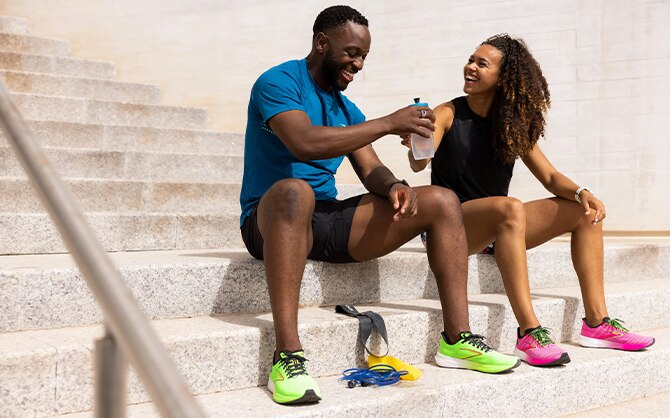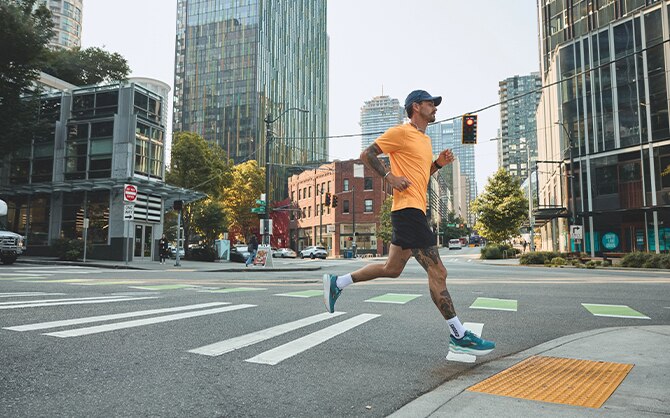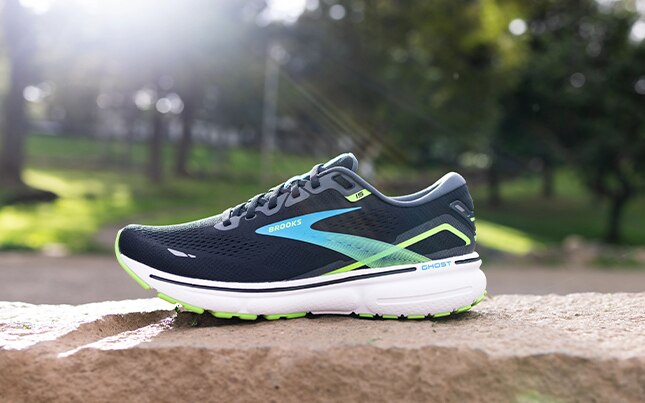New year, new me: How to set achievable goals for 2024

As we step into 2024, it's the perfect time to embrace new beginnings and opportunities. But that doesn’t mean you have to make grand resolutions and drastic changes.
Instead, take a little time to reflect on how far you’ve come over the last 12 months—celebrating your successes and learning from your challenges—and learn how to set yourself realistic goals for the year ahead. Whether it's improving your running times or trying to be more mindful, we're here to help you move your physical and mental health in the right direction.
With expert advice from Montreal-based Mental Performance Consultant (MPC) Camille Charbonneau, here’s how to make 2024 a year of meaningful progress for your physical fitness, mental health, and overall wellness.
Jump to section:
Run towards physical fitness

We’ve all made New Year’s resolutions to quickly undo the indulgence of the holidays, but Camille recommends thinking bigger: “Creating short-term goals or milestones can help you break the big goal into realistic and actionable steps that actually help you move forward. Writing this down somewhere that you can come back to and track progress will be helpful for you to stick to the plan.”
Running is a great choice in the fitness category because it's not just about building endurance or losing weight—it’s about continually passing personal milestones according to your age, fitness level, and other factors. To maximize your chances of success in your running journey, here are some steps to consider:
- Reflect on your past experiences: Think about the types of physical activities you've engaged in and enjoyed previously. What has worked well for you? Can your past successes become the foundation of your new fitness routine?
- Make it meaningful: “You are more likely to achieve a goal if you’re intrinsically motivated,” explains Camille. “On those challenging days when it’s hard to show up, it always comes back to your why, and if you’re doing it to impress people or for someone else, it can be difficult to push through those hard days.”
- Consider your lifestyle and schedule: The fitness goals you set have to be compatible with your daily routine. If there are specific times of the day or week when you're more likely to run or work out, make them a fixed part of your schedule. The more your goals fit your lifestyle, the more likely you are to reach them.
- Connect your body and mind: Give some thought to the ways your physical fitness goals will align with your mental health objectives. How does running or exercise improve your mood? Avoid setting fitness goals that are likely to add to your stress levels rather than reduce them. Exercise should be fun!
- Seek inspiration and support: Look for sources of motivation, whether it's joining a running group, following a fitness influencer, or partnering with a friend. Having a support system can provide additional motivation and accountability.
- Remember that plans change: “Life happens,” says Camille, “and being able to adjust and be flexible is key. We need to be accountable to not only follow-through with the action items and habits, but also be open to adapting the plan when needed.”
Whether you’re an experienced runner or just starting out, remember that the right gear can make all the difference. That’s where Brooks steps in. From the unrivaled cushioning of the Ghost running shoe to the racing-tuned Hyperion—as well as our wide selection of high-quality men’s and women’s running apparel—we’ll make sure you’re well-equipped for your fitness journey.
Embrace mental well-being

Physical activity plays an important role in your mental well-being. In fact, rigorous exercise can be a powerful catalyst for emotional balance, clear thinking, and overall psychological health. Running, for example, is particularly effective in reducing stress. It triggers the release of endorphins, often referred to as the body's "feel-good" hormones, which create a natural high and elevate your mood.
But it’s not just about working out to feel good in the moment. As you prepare to set your mental health goals for 2024, consider the following framework to keep them relevant and achievable:
- Reflect on your mental state over the past year: Look back and identify times when you felt overwhelmed, stressed, or disconnected in 2023. This reflection may help you pinpoint areas that need attention and improvement.
- Analyze patterns and triggers: After identifying these moments, delve deeper to understand patterns or triggers. For example, were there any recurring themes or situations that led to these feelings? Recognizing these will help you set more specific goals.
- Keep your daily routines in mind: Think about how your daily routines and responsibilities might affect your ability to achieve the goals you set. This understanding is crucial for setting realistic targets.
- Identify areas for growth: Based on your reflections and current lifestyle, pinpoint specific areas where you wish to see improvement or change. This could range from better stress management to enhanced mindfulness.
For example, to set a goal around mindfulness, start by reflecting on moments from the past year when you felt the most distracted or stressed. Thinking about the factors that influenced these moments and whether they were external pressures or internal thoughts. Based on this reflection, you might set a goal of dedicating 10 minutes each morning to mindfulness practices such as meditation, ensuring this fits into your daily schedule realistically. This process of reflection, analysis, and adaptation will help you set mental health goals that are not only specific but also achievable and relevant to your personal needs.
Finding balance in the new year

To start 2024 on the right foot, Camille explains that it's essential to strike a balance between your physical and mental goals: “Recognizing the connection between physical and mental health is important for overall well-being. The more we understand how that relationship affects us, the more we can work on implementing effective prevention strategies, developing healthier coping mechanisms, and making better lifestyle choices.”
So, rather than simply aiming to push your limits in running or other physical pursuits, focus instead on taking the right steps to nurture your overall well-being. A balanced approach not only prevents burnout but can make your wellness journey much more rewarding and enjoyable. All it takes is a few simple steps to create a structured-yet-adaptable schedule that supports both your physical and mental goals:
- Set specific times: Build a routine with specific times for running and mental wellness activities. This makes it easier to stay accountable to your goals.
- Be flexible: Routine is important, but it’s also crucial to be flexible. Adjust your schedule as needed to accommodate life's uncertainties.
- Mix it up: Alternate between different types of physical activities and mental wellness practices to keep your routine interesting and engaging.
- Write it down: “Putting the goal somewhere visible—like on your whiteboard at home, creating a vision board, or writing it on a sticky note somewhere you can see daily—is a great visual cue,” says Camille.
- Keep it fun: Choose activities that you enjoy. If you love what you’re doing, you’re more likely to stick with it long-term—especially if it comes with an inspiring playlist!
The Brooks Running Community
Good news! Just by being here, you’re part of the Brooks Running community. We offer all the support, motivation, and resources you need to succeed in your wellness journey, from great running gear to training workouts, virtual challenges, and inspiring stories.
As we step into a new year, remember that life is a journey, not a destination—and on the road of life, it’s always better to travel in packs. Embrace the Brooks Running community as you set yourself achievable goals, equip yourself for the miles ahead, and take every opportunity to nurture your physical and mental health.
Shop this article
This is a carousel. Use next and Previous buttons to navigate.

CONTRIBUTING EXPERT
Camille Charbonneau
Mental Performance Consultant (MPC)
Through individual coaching, workshops, and specialized programs, Camille helps athletes and high-performers change the way they think so they can show up as their best. By applying the same practices in her own endeavors as a runner and Olympic weightlifter, she has equipped herself in ways she couldn't imagine to better navigate injuries, being a new mother, and building her own business.
Disclaimer: Our writer's advice is intended for informational or general educational purposes only. We always encourage you to speak with your physician or healthcare provider before making any adjustments to your running, nutrition, or fitness routines.
